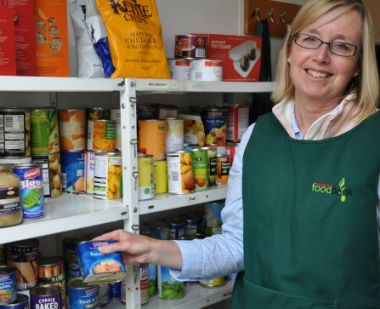Bishop of Manchester: Why foodbank appeals are the new normal

There's a new Christmas tradition spreading across the churches in my diocese.
I met it first only two or three years ago, but it's rapidly becoming as ubiquitous as carol services and nativity plays. It's the special appeal for contributions to Christmas food parcels to help those who are clients of the local foodbank.
Churchgoers recognise both that Christmas is a difficult time for those who struggle to make ends meet, and that even the poorest ought to have something a little better than normal fare at what every TV or newspaper advertisement reminds us is the "festive season".
These most recent developments are yet another sign that food poverty has become a normal state of life for many in our communities. Nobody is surprised any more by stories of mums having to decide which members of the family get to have a meal one evening, or by households facing the choice on a cold winter's day, of "eat or heat?"
On the positive side, they're a sign that, after a period of exponential growth in food poverty, with new foodbanks opening up while existing ones moved into larger premises and increased their opening hours, demand has begun to level out. Staff, volunteers and donors now have the capacity to think about additional offers, whether it be summer holiday 'school dinners' or Christmas parcels.
We can all be truly thankful that demand for foodbank parcels has, over the last year or so, begun to settle, though only after climbing to a figure of around a million three day parcels a year. It's an extraordinary high level compared with only a few years ago and one that I would never have imagined we would reach.
What seems bizarre, though, is that some commentators are suggesting this plateau in demand means that the problem of food poverty has gone away. It hasn't. It's too many, and there's no guarantee that it won't rise again soon.
We've got away with a pretty mild winter so far. Any significant cold snap will test the stretched resources of breadline families beyond their capacity to meet the challenge. There's also been a period of relative stability in the benefits regime, especially with the Chancellor abandoning plans to make severe reductions in tax credits. But a Welfare Reform Bill is on its way through parliament and history suggests that whatever further cuts emerge as part of it will bring a fresh crop of clients to our counters.
So remember your foodbank this Christmas. Its work isn't over, it's just becoming part of the new normal. Its Christmas collection is establishing itself alongside mince pies and mistletoe, as part of the season's traditions. Whilst this very tangible expression of goodwill to all is vital in stopping hunger in our communities this Christmas, I believe a good new year's resolution would be to reduce the number of men, women and children facing hunger in the first place.
Rt Rev David Walker is the Bishop of Manchester.











